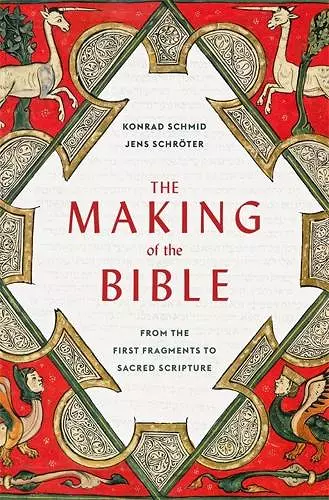The Making of the Bible
From the First Fragments to Sacred Scripture
Konrad Schmid author Jens Schröter author Peter Lewis translator
Format:Hardback
Publisher:Harvard University Press
Published:26th Nov '21
Currently unavailable, and unfortunately no date known when it will be back

“The Making of the Bible is invaluable for anyone interested in Scripture and in the intertwined histories of Judaism and Christianity.”
—John Barton, author of A History of the Bible: The Book and Its Faiths
The authoritative new account of the Bible’s origins, illuminating the 1,600-year tradition that shaped the Christian and Jewish holy books as millions know them today.
The Bible as we know it today is best understood as a process, one that begins in the tenth century BCE. In this revelatory account, a world-renowned scholar of Hebrew scripture joins a foremost authority on the New Testament to write a new biography of the Book of Books, reconstructing Jewish and Christian scriptural histories, as well as the underappreciated contest between them, from which the Bible arose.
Recent scholarship has overturned popular assumptions about Israel’s past, suggesting, for instance, that the five books of the Torah were written not by Moses but during the reign of Josiah centuries later. The sources of the Gospels are also under scrutiny. Konrad Schmid and Jens Schröter reveal the long, transformative journeys of these and other texts en route to inclusion in the holy books. The New Testament, the authors show, did not develop in the wake of an Old Testament set in stone. Rather the two evolved in parallel, in conversation with each other, ensuring a continuing mutual influence of Jewish and Christian traditions. Indeed, Schmid and Schröter argue that Judaism might not have survived had it not been reshaped in competition with early Christianity.
A remarkable synthesis of the latest Old and New Testament scholarship, The Making of the Bible is the most comprehensive history yet told of the world’s best-known literature, revealing its buried lessons and secrets.
A landmark…This is a rich book treating the historical traditions that lie within the texts, the oral traditions that transmitted them down the generations, the processes by which texts were formed and collected within scribal culture, and the way in which this gradually led to the formation of various canons…If you have time to read only one book on the Bible this year, make sure that it is this one. -- Katherine J. Dell * Church Times *
Excellent…With a sure touch, the authors lead the reader through the geopolitical context of the Hebrew Bible and the setting and background of the New Testament, finding something to say about practically every book’s origins and development…The Bible is not a fixed entity, clearly delineated from all other writings, even though our culture tends to see it so. -- John Barton * The Tablet *
Outlines how different forms of the Bible came into being. Their focus is historical and philological rather than theological or literary. Yet the story they tell is engrossing: that of an unstable world needing to attend to the values of God’s kingdom. They help a non-specialist reader appreciate the fascinating diversity of ways in which the Bible’s message was regularly reinterpreted in a changing political situation…Together, Schmid and Schröter…show that the history of the Bible is much less fixed than has been imagined. -- Constant J. Mews * Australian Book Review *
A richly detailed resource…packed with interesting information about the Bible and its use in the Jewish and Christian traditions. * Choice *
The Making of the Bible is an impressive and up-to-date account of its subject matter, simultaneously comprehensive…and concise… The prose is accessible to non-specialists. And while biblical scholars will already know much on offer here, even they will be surprised by the occasional fact or theory. The book will be most useful as an introductory textbook in masters-level classes and as an entrée to the topic for outsiders to the guild. The sheer amount of information packed between the covers is an achievement in itself. -- Brad East * Interpretation *
A remarkable deep dive into foundational books whose origins are often taken for granted. * Publishers Weekly *
With this exemplary account of both origins and canonization, Schmid and Schröter have given us a superb book on how the Bible came into being. The Making of the Bible is invaluable for anyone interested in Scripture and in the intertwined histories of Judaism and Christianity. -- John Barton, author of A History of the Bible: The Book and Its Faiths
The Making of the Bible will be a go-to for me. It does for the history of the Bible what I’ve sought to do for the Bible’s languages: to make this book real. -- Sarah Ruden, author of The Gospels: A New Translation
An erudite history of ‘How We Got the Bible’ that addresses the key issues—historical backgrounds, oral traditions, ancient manuscripts, canon formation, and the books that were left out. Schmid and Schröter are expert guides along these rocky paths for all readers interested in the New Testament and the Hebrew Bible. -- Bart Ehrman, author of Heaven and Hell: A History of the Afterlife
This impressive book tells the story of how the Bible was made. In the process of that telling, the authors unearth a second story of equal significance: how these different Bibles formed us, creating a world shaped by sacred scripture. Today, we're grappling with the consequences of both stories, which makes this book an essential guide for the future. -- Martin Puchner, author of The Written World: The Power of Stories to Shape People, History, and Civilization
This comprehensive book on the Bible—the Hebrew Bible as well as the New Testament—by two world-renowned theologians is for students and teachers alike. It will be read with pleasure and benefit by everyone interested in the most important document of Western civilization. -- Thomas Römer, author of The Invention of God
ISBN: 9780674248380
Dimensions: unknown
Weight: unknown
448 pages